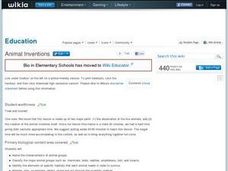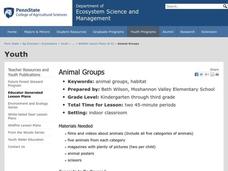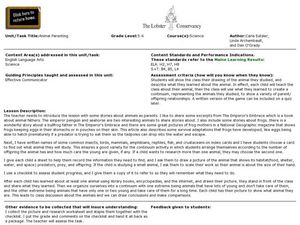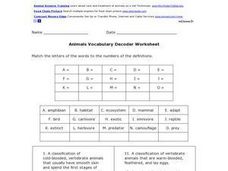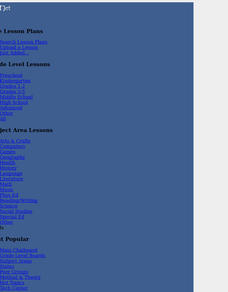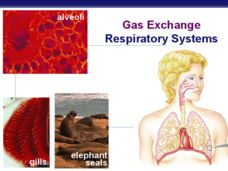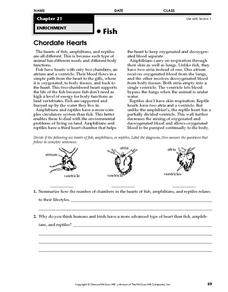Curated OER
Amphibians Internet Activity
In this amphibians worksheet, students click on the links in the questions about amphibians to find the answers to the questions and then come back and answer the questions. Students answer 10 questions total.
Curated OER
Animal Inventions
Students name the characteristics of animal groups. Students classify the major animal groups such as: mammals, birds, reptiles, amphibians, fish, and insects. They identify the elements of specific habitats that each animal needs in...
Curated OER
Animal Classification
Second graders identify characteristics of and group animals by the five categories of vertebrates.
Curated OER
Animal-mania
Young scholars explore the concept of scientific classification systems using a guided Internet research activity. They answer specific questions on the classification of animals by exploring a different Internet link for each question.
Curated OER
Sunken Millions
This PowerPoint features a game based on the animal life. The interactive slides include 20 questions about animal needs, animal groups, and animal traits. The questions include multiple choice answers and 4 different levels of...
Curated OER
Kids for Conservation: Animal Unit
Students discuss animal needs and characteristics. In this animal mini-unit, students complete three activities studying different animals, their needs, how they have evolved, and how to protect them.
Curated OER
Animal Groups
Learners explore animal groups. For this animal science lesson, students use pictures from magazines and classify the animals into five categories. Learners share why they categorized the animals the way they did.
Curated OER
Animal Classification
Young scholars recognize the six groups of animals (Mammals, fish, birds, reptiles, amphibians and arthropods) and their characteristics. In this animal characteristics lesson, students sort animals by their traits. Young...
Curated OER
Animals Galore
A well-designed lesson which covers the characteristics of the animals found in the six animal groups is here for your young biologists. In it, learners divide up into six groups; the amphibians, reptiles, mammals, birds, fish, and...
EngageNY
Reading about Freaky Frogs: “The Glass Frog”
Freaky frogs are the focus of a lesson plan designed to boost reading comprehension skills using text features and asking and answering questions. Informational text and a poem supply scholars with animal-related vocabulary and facts. A...
Curated OER
Animal Categories
Pupils sort animal picture cards into classification groups such as mammals, reptiles, amphibians, insects and fish. They discuss the characteristics that each group of animals shares then arrange the pictures into a clasificatioon poster.
Curated OER
Animal Alphabet
Second graders identify animals with each letter of the alphabet. In groups, they create a PowerPoint presentation which shows the information they have collected about each one. Using all of this information, they create an animal...
Curated OER
Heating and Cooling a Really Large Lizard
Remind your middle school scientists how fox ear size varies depending on the climate they live in; large ears allow heat loss while small ears keep heat in. Discuss how a cold-blooded animal might try to regulate body temperature. Then...
Curated OER
The Animal Kingdom of Vertebrates
Seventh graders classify fish according to their characteristics. In this classification lesson students learn how to group animals including birds, reptiles and amphibians.
Curated OER
Animal Parenting
Students analyze parenting instincts. In this parenting instincts lesson, students view a drawing of animal they studies and describe what they learned about the animal. Students teach the class about their animal and the class creates a...
Curated OER
What's Your Classification
Students classify animals. In this animal groups lesson, students watch a video on animal groups and review the six animal groups. Students practice classifying animals using stuffed animals.
Curated OER
Dress Like A Frog
Students recognize amphibian adaptations. In this amphibian activity students explore amphibian adaptations that provide for successful living in their environments. A volunteer dresses up with all of the adaptations using everyday items...
Curated OER
Animals Vocabulary Decoder Worksheet
Add some decoding to your scholar's review of basic life science terms in this decorder instructional activity, where students match 15 words to their definitions. Words such as mammal and amphibian must be matched to their written...
Curated OER
Animal Classification
Students classify animals. In this animal classification lesson plan, students identify characteristics from each of the 5 categories of vertebrates. Students group animals by categories.
Curated OER
Circulatory Systems
A slideshow that covers the all-important details related to basic human circulation. The reasoning for exchange of material methods is presented and then labeled diagrams of the main human transfer systems are shown, along with...
Curated OER
Gas exchange: Respiratory Systems
The need for a respiratory system in humans versus being reliant on gas exchange structures is demonstrated. There are many details about the advantages and disadvantages of each mechanism. Students are able to learn about the...
Curated OER
Scales, Scutes, and Skins
Young scholars identify the various adaptations of reptiles and amphibians. After distinguishing between reptiles and amphibians, students discuss the ways in which their adaptations aid in their survival. They participate in a hands on...
Curated OER
Chordate Hearts
In this chordate hearts activity, students read a passage describing the differences of the hearts of fish, amphibians, and reptiles. After reading, students label diagrams and answer questions.



